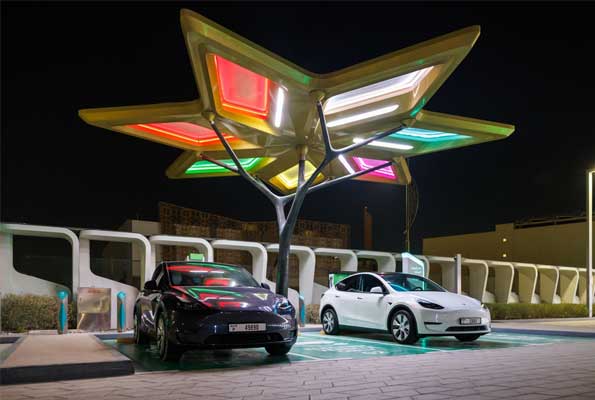COP28, a significant international gathering that will take place in the UAE in 2023 at Expo City Dubai, will coincide with the UAE National Day. Over 140 heads of state and other top government officials, over 80,000 delegates and 5,000 media personnel will attend the event.
The event will bring together international decision-makers to combat climate change. Dubai is concentrating on sustainable mobility solutions because transportation is a significant source of CO2 emissions.
Electric vehicles (EVs) are essential for lowering emissions, and the market for EVs is expanding in both nations. Dubai’s dedication to EV adoption and the building of charging infrastructure complements the audacious target of other member countries like India, which plans to have 100% EV adoption by 2030. The partnership between Dubai and India sets the path for a more environmentally friendly future.
Sulmi EB-ONE, an advanced electric motorcycle, was unveiled as a teaser for the event. It is the first commercially viable product from Sharjah Research, Technology, and Innovation Park’s (SRTIP) SoiLAB facility, the area’s most significant cutting-edge maker space.
In the December run-up to COP28 in Dubai, the reveal represents a significant turning point for the UAE’s sustainable mobility and transportation industry and another step toward the country’s clean energy aspirations.
Currently, 23% of the world’s CO2 emissions come from the transportation industry. Reducing transport-related CO2 emissions by at least 50% by 2050 is a broadly agreed-upon objective in the fight against climate change. To significantly reduce CO2 emissions, electric means of transportation and public-private initiatives are essential. Electric vehicles (EVs) provide a fuel-efficient substitute that substantially reduces emissions and advances sustainable mobility.
An estimated annual growth rate of 30% in the UAE between 2022 and 2028 indicates that the worldwide EV market will reach a value of USD 300-500 billion within the next ten years. The UAE is one of the top 10 nations in the world for EV adoption.
Due to rising gasoline prices, almost 52% of UAE citizens said they would like to switch to hybrid or electric vehicles. Al-Futtaim, a forward-thinking local family business, offers superior and reasonably priced electric vehicles, such as the BYD ATTO3 C-SUV, intending to democratize the local EV market. The UAE government’s ‘Net Zero 2050 Strategic Initiative’ highlights EVs’ significance in lowering carbon emissions.
Dubai Electricity and Water Authority (DEWA) started the EV Green Charger Initiative to make EVs more widely available. By 2030, collaborations hope to install 10,000 EV charging stations in the UAE, which now has 325. In the United Arab Emirates, the Ministry of Energy and Infrastructure is looking into laws to improve the EV charging infrastructure, shorten charging times, boost efficiency, and keep costs affordable.
The Road Transport Authority (RTA) provides incentives such as free parking, toll exemptions, and decreased registration prices. By 2027, Dubai wants all cabs to be electric, hybrid, or hydrogen-powered.
Moreover, to hasten the transition to environmentally friendly transportation and strengthen the sustainability of the air cargo sector, the UAE Regulations Lab has granted a license for electric cargo aircraft.
To test electric vertical takeoff and landing aircraft in the United Arab Emirates, a license was granted in cooperation with the logistics provider United Parcel Service.
Sheikh Mohammed bin Rashid, Vice President and Ruler of Dubai, announced during the ‘World Government Summit’ in Dubai that air taxis will start flying in Dubai within three years. These developments might become game-changers in the fight against climate change.
Though the UAE has revised its NDC and included emissions reductions of 40% from business as usual, it still comes under much criticism.
According to the former United Nations climate head, the United Arab Emirates’ approach to the Cop28 climate summit, which it will preside over in November 2023, is “extremely risky” and poses a “direct threat to the survival of vulnerable states.”
Christiana Figueres, who played a vital role in the historic Paris climate deal delivery in 2015, also stated that the nation hosting the United Nations summit could not take a position and had to remain neutral.
The UAE is a significant producer of oil and gas, and Sultan Al Jaber, the president-designate of the Cop28 conference, also serves as the CEO of Adnoc, the UAE’s national oil and gas corporation.
Al Jaber’s competing interests question his credibility, but he has been adamant that there is no practical climate solution without the support and cooperation of oil producers.



